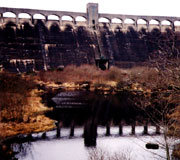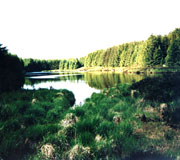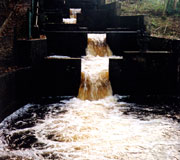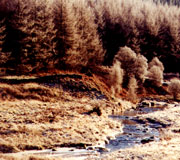
 |
|||||
| The Objectives ~ an Outline | |||||||||||||||
|
Despite the unquestionable success of
the Hydro-electric system on the Dee, and the economic benefits that
the forestry has brought to the area, the Dee River System underwent
dramatic changes during the 1930's with the construction of the Dam
System and again in the 1960's when large areas of hillside were blanket
planted with conifer trees. Now, in this age of bio-awareness, it is
time to address some of the problems that have arisen as a result of
these schemes and to redress the ecolgical balance of the Dee River
System.
|
 |
||||||||||||||
 |
The objectives for Dee River conservation
are to restore balance in the ecology of the Dee, and to restore a passage
up and down the rivers for salmon and other fish so that they can again
breed in the upper reaches of the Dee, Ken and Deugh rivers. It is essential
in this eco-sensitive age, however important and beneficial the hydro-electric
scheme and forestry are to the economy of this region, that the ecology
of the Dee River area be given due consideration.
|
||||||||||||||
|
The D(K)DSFB supports the work of the
Galloway Fisheries Trust and was responsible for initiating the original
survey. The Board has for several years spent its limited funds and
resources working with Scottish Power to redress some of the problems
caused by the construction of the Dam System. These problems were inherited
by Scottish Power when it took over the Galloway Dam System. Scottish
Power have already improved the ladder on the lower dam at Tongland
and commissioned fishing consultants to survey the upper dams with regard
to improvements.
|
 |
||||||||||||||
 |
The Dee River Habitat Restoration Project
is a plan for immediate action, to begin restoring the natural habitat
of the rivers, lochs and streams of the Dee River system. The improvements
detailed in the project are based on an in-depth scientific
survey (read the Report) carried out by the Galloway Fisheries Trust,
which identifies the groundwork that needs to be undertaken to improve
fish runs, increase fish stocks and reverse the ill effects of acidification
caused in part by over forestation of the hillsides.
|
||||||||||||||